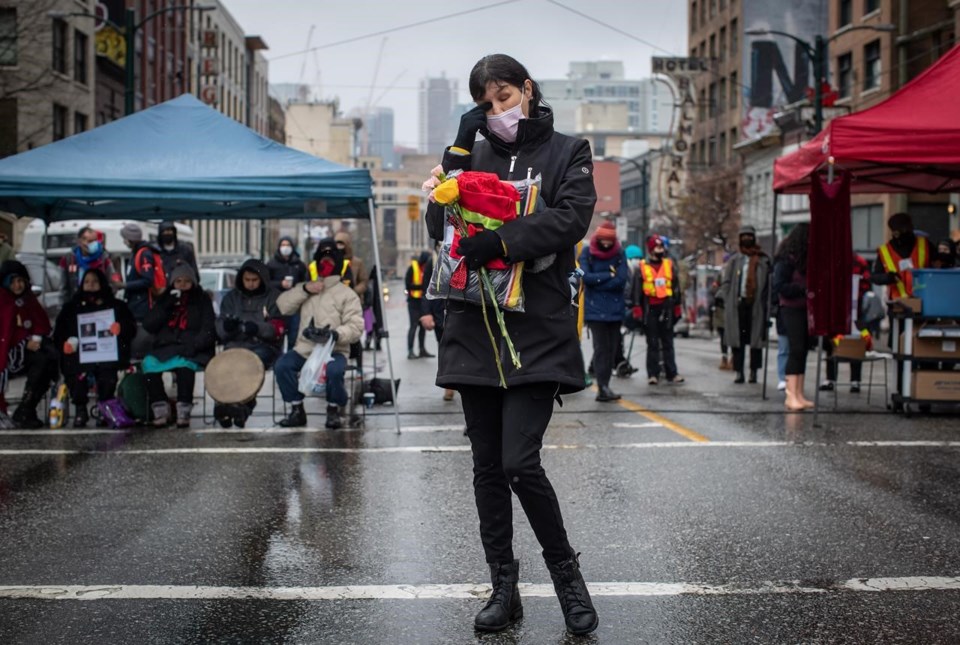VANCOUVER — Despite the hurt and emotional trauma of reliving her sister and niece's death, Pauline Johnson said she has yet to miss a year of the Women's Memorial March in Vancouver's Downtown Eastside, now in its 30th year.
Johnson was one of the hundreds of people who gathered in the snow for the annual march, which is held to honour and remember women lost to violence, abuse, poverty and systemic racism.
Johnson's sister Rose Marie Johnson died in 1980, and her death has been linked to a man who was convicted of another death in a separate incident.
Charlene Kerr, Johnson's niece, was stabbed to death in the Lamplighter Hotel in the 1980s.
"There should be some change. It's disheartening that there isn't," she said, adding that there needs to be more awareness of the violence Indigenous women and men face.
Johnson said little has been done to properly investigate the disproportionate amount of Indigenous women that go missing or are killed in Vancouver's Downtown Eastside neighbourhood.
"Because we're First Nation, we're meaningless to society. That gets to be tiresome," she said.
Serial killer Robert Pickton was convicted in 2007 on six counts of second-degree murder but is suspected of killing dozens of women who went missing from the Downtown Eastside.
Vancouver police were criticized for not taking the cases seriously because many of the missing were sex workers or drug users.
Myrna Cranmer, one of the event's co-organizers, said both violence and COVID-19 have had a profound affect on the health of women in Vancouver's Downtown Eastside neighbourhood this past year.
She estimates 50 women from the neighbourhood have died under violent circumstances or from COVID-19 since last March.Â
"Some of the names that come up every year, it just really hurts my heart," Cranmer said. "I've known these women, I've worked with them and it's just very sad."
Vancouver police couldn't confirm the number, saying it would not be possible to accurately search for cases by gender or trace where someone from the neighbourhood may have died, such as a hospital or a different part of the city.
The case of Tonya Hyer, who was found beaten to death in a hotel operated by non-profit dedicated to ending violence against women on Jan. 19, 2020, has stuck with Cranmer.
"They still don't know who killed Tonya," Cranmer said. "We need to remember their names, even if it's only for that one day. The women in the Downtown Eastside are ignored to death. No one remembers them."
Vancouver police spokesman Sgt. Steve Addison said Hyer's death is still an active investigation and no arrests have been made.
Due to COVID-19, Sunday's march was livestreamed to allow people to stay home if they were sick or did not feel comfortable attending a large event.
Provincial government officials issued a joint statement Sunday recognizing the 30th anniversary of the march and highlighting the challenges faced by Indigenous women, particularly during the COVID-19 pandemic.
The officials, including Premier John Horgan and Indigenous Relations Minister Murray Rankin, noted that one in five Indigenous women had reported being a victim of physical or psychological violence across Canada during the COVID-19 pandemic.
They promised to continue working with Indigenous communities to end gender-based violence in B.C.
This report by The Canadian Press was first published Feb. 14, 2021.
Nick Wells, The Canadian Press




